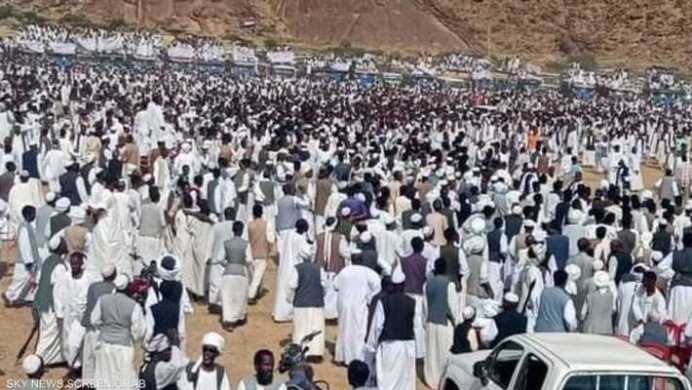East Sudan’s tribal and political divisions
January 16, 2023 (KHARTOUM) – Two leading – but conflicting – figures within the Supreme Council of Beja chiefdoms adopted a similar stance by declaring their refusal to be part of the ongoing political process in the country and threatening to withdraw their recognition of the central authority in Khartoum by taking arms and even seceding from the rest of Sudan.
The head of the Beja Council Sayed Terik along with the council’s Rapporteur Abdallah Obchar both renewed their demand for the abrogation of the ‘Eastern Sudan track’ that is part of the Juba Peace Agreement (JPA). Furthermore, they called for launching new negotiations for the region that would enable its people to discuss their issues including the right to self-determination.
“We have demands and clauses. Whoever shall accept we can deal with, even if it is the Forces for Freedom and Change (FFC),” Abdel Basit Wad-Hashi, a spokesperson for the council told Sudan Tribune.
Obchar for his part said, “Unless the issues of the East are clearly adopted by cancelling or suspending the ‘Eastern Sudan Track’ and announcing a new negotiating platform, we will not be part of any workshop or conference”.
Why the dispute broke out within the council?
Wad-Hashi, who is part of Terik faction, denied the existence of fundamental differences between the two feuding groups within the council and noted the expansion of the council to include 70% of east Sudan components which necessitated restructuring that is opposed by Obchar.
In June 2022, Terik announced that the work of the council has been frozen and accused groups within it of deviating from its goals. The move prompted defection by several figures who also accused Rapid Support Forces (RSF) commander Muhammad Hamdan Dagalo (Hemedti) of “interfering in the affairs of Beja and influencing Terik to change his position on the Juba agreement”.
Another tribal bloc has emerged under the name of “The Supreme Council of Native Administrations in Eastern Sudan”, which included 17 major tribes: Bani Amer, Al-Habab, Al-Bishari, Al-Amar, Al-Dabainah, Al-Sulayhab, Al-Bawadara, Al-Lahween and Al-Jamilab. This bloc supports the ‘Eastern Sudan Track’ and the December 2022 framework agreement.
How did political and social agendas overlap in eastern Sudan?
The official spokesman for the new bloc Ibrahim Ismail Gamea told {Sudan Tribune} that there is no social conflict in eastern Sudan but a political one that provoked tribal fanaticism before it was remedied and stopped.
Some political analysts believe that at least some of those figures have ascended to politics through the tribal ladder and are now looking out for their personal interests.
Abdel Moneim Abu-Idris, a journalist specializing in eastern Sudan affairs explained saying that this “constituted an entry point for disagreement even within the Beja Supreme Council when Tirik started practising his social habits in politics”.
Historical Context
Part of the discord between the elements within the Beja council stems from Terik’s utilization of Port Sudan in the conflict with Khartoum even though the port area is inhabited by the al-Amrar tribe while Terik hails from the al-Hadandwa tribe and is thus using their land to reap political gains.
Gamea appeared to agree with this viewpoint and recalled that several Hadandwa figures had assumed senior positions during the rule of ousted President Omer Hassan al-Bashir.
He also noted the events of 2005 when police clashed with Amrar tribe members killing scores of them.
Did Khartoum fuel the conflict in eastern Sudan?
Abu-Idris told Sudan Tribune “One of the problems in eastern Sudan is the use of tribal tendencies that have an emotional nature that is more effective in mobilizing and using that to achieve political gains”.
“I believe that Khartoum plays a role in fueling the situation and attracting the various parties without considering the seriousness of the matter on the social components. There is also a third party in the form of regional interventions that are motivated by the geopolitical importance of the East, with its land and sea borders” he added.
What is the legacy of the Bashir regime in eastern Sudan?
Al-Bashir’s regime has instituted the tradition of distributing political portfolios in eastern Sudan based on political affiliation. As such the governor of the Red Sea was picked from the Hadandwa tribe and his deputy from the Bani Amer tribe. The governor in Kassala state is from the Bani Amer and his deputy is from the Hadandwa.

